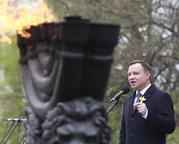
Poland’s president on Tuesday led state ceremonies honoring the heroes of the Warsaw Ghetto uprising, young Jews who took up arms to fight against the Nazi German occupiers during World War II rather than be transported to a death camp.
President Andrzej Duda led the ceremonies on the 73th anniversary of the start of the uprising, April 19, 1943. That marked the start of a desperate three-week struggle in which several hundred Jewish insurgents staged struggled against the Nazi drive to liquidate the last 75,000 inhabitants of the walled ghetto.
Almost all of the fighters were crushed by the overwhelming forces of the German army, but they died as they chose: arms-in-hand. As every year, the main state ceremonies were held in front of a memorial to the hundreds of Jewish fighters in the heart of the former Warsaw Ghetto.
Duda said he was paying homage to “heroes who wanted to fight for their freedom and even though they knew they would die, they wanted to die in battle with a raised head.” He said the ceremony honored their “great dignity.”
Later in the day, German Foreign Minister Frank-Walter Steinmeier, who was on a visit to Warsaw, paid his respects to the fighters, laying a wreath at the monument and bowing his head before it.
During a news conference alongside his Polish counterpart, Witold Waszczykowski, he described the uprising as “heroic, desperate and courageous.”
Steinmeier added that politicians have the “responsibility to continue the reconciliation that our fathers began in the decades after the war.”
Earlier in the day, city authorities unveiled a plaque in memory of Swedish diplomat Raoul Wallenberg, who helped save Hungarian Jews from the Holocaust. In 1945, he was arrested by Soviet secret security and taken to Moscow and never heard from again.
[SOURCE:- AP]



